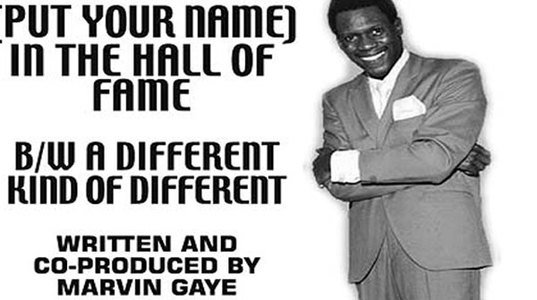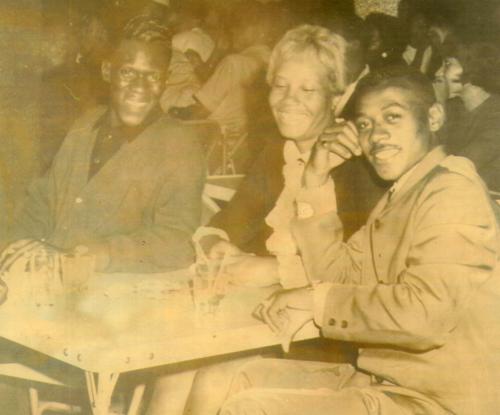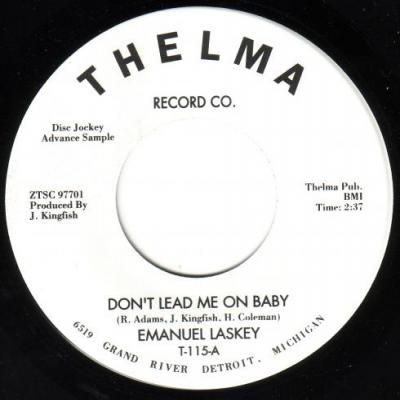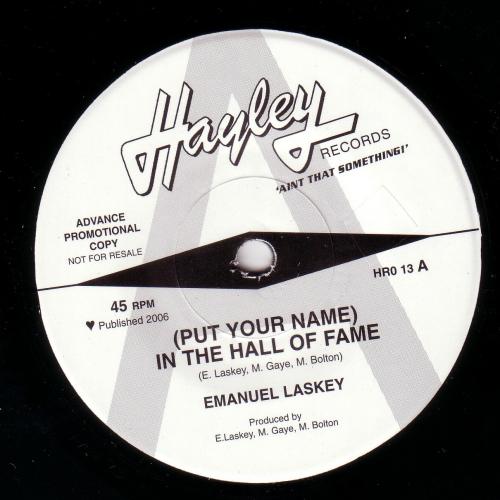Emanuel Laskey - This is his story by Rob Moss
the 'full' version

Site note - this article was originally published on Soul Source in full back in 2006, it was clipped approx 2012 at the author Rob Moss's request. Rob here in 2023, has just given us the ok to revive and re-publish this and others in full.
This is the second revived one and the plan is to revive the others on a weekly basis.
Famed Detroit producer/songwriter Clarence ‘Clay' McMurray once stated "...there are only two real voices in Detroit of any consequence - Emanuel Laskey and James Epps." Seen in the context of a post war setting, and ignoring the omnipresence of natives like Aretha, the Motown ensemble and Jackie Wilson, this statement has a resonance and reassurance that bears a lasting testament to two of the best singers to emerge from the Detroit music revolution of the early 1960s. Neither reached the commercial plateau their talents deserved, yet both made some of the most compelling recordings ever made during that very special decade. Both have distinctive, easily recognizable voices that easily convey the emotions they dealt with. Emanuel Laskey's career began in 1962 and spanned over two decades. This is his story.
James Emanuel Laskey passed away in his apartment in the lower east side of Detroit on 23rd June, 2006 after a long battle with cancer.  He was 61.His legacy, as one of Detroit's finest vocalists and performers, is assured, and he leaves a significant body of recorded work that will maintain his memory ad infinitum. As a person, he was a very special individual who will be sorely missed and fondly remembered by all who had the privilege to have made his acquaintance.
He was 61.His legacy, as one of Detroit's finest vocalists and performers, is assured, and he leaves a significant body of recorded work that will maintain his memory ad infinitum. As a person, he was a very special individual who will be sorely missed and fondly remembered by all who had the privilege to have made his acquaintance.
From the outset, he opted to call himself Emanuel, and not his given name James, deciding that it sounded more ‘showbiz' and had a more attractive sound and appeal. While still a teenager, he began to frequent a local east side club where many aspiring singers and musicians gathered. With a wistful smile of fond recollection he reminisced about those early days. "We all started at this club, The Village, on Alexandrine and Seldon. Nathaniel Mayer was there, Billy Lee (Mitch Ryder) was there, Ronnie Abner, Tommy Stone (Storm) and Joe Harris and myself. The Village became a very strong starting point in Detroit for a compilation of local artists around '63, 64." It wasn't long before Laskey came to the attention of erstwhile Motown star, Richard Street, and producer Don Davis, who had aligned themselves with one of the many fledgling record labels in the city, Thelma's Records. The label was owned and operated by the parents of Berry Gordy Jnr.'s first wife Thelma, Robert and Hazel Coleman who named it after their daughter. " Thelma was the very first recording company that I did anything with professionally. Don hadn't got there at that point. Richard Street was there. Richard had his own group, the Distants, and he's the one who actually heard me sing - and when he heard me he immediately told the Colemans about me. He was playing piano for me. It was shortly after that that Don came. When Don Davis came in, that's when the ball started rolling." Davis began organizing recording sessions at United Sound Studios on Second Avenue, utilizing many of the local session musicians who would later develop into various strains of Detroit's famed ‘Funk Brothers' and scoured the city for additional artists, writers and producers. Laskey is philosophical about the rise of Gordy's Motown empire and the role played by all the other smaller operations in the city. "During that time, I think what it was, there were so many small labels in the city of Detroit, that had it not been for them, it would have been hard for Motown to be a focal point. There were people at Thelma Records, there was Correctone, Mike Hanks' D Town Records, Fortune ...with various artists that were just as comparable had they had the right finances behind them. Then Motown would have had some adequate competition." Producer Don Mancha, who wrote and produced two of Laskey's finest Thelma recordings, ‘Peace loving man' and ‘Sweet lies' agrees but goes a little further. "We had good songs but the artists didn't have good management and many of the smaller labels, including Thelma, didn't have the contacts across the country to allow national success. We had talent in Detroit but really, no one knew what they were doing compared to New York. It was like a gold rush but everyone was learning their craft as they went along."
Emanuel Laskey's first recording for Thelma was a song he wrote with Thelma Gordy (Coleman) and Richard Street in 1963 - ‘Welfare Cheese'. It became a sizeable regional hit, both in sales and radio play, on release and looked destined to crossover to a national market. Then, in November, 1963, President John F. Kennedy was assassinated in Dallas, Texas and sales of the record were suspended. While this might seem an over reaction, the reasoning was sound and respectful, because a lyric in the song referred to Kennedy by name. By the time the record returned to the market, momentum had been lost and the opportunity missed. It was re issued as the B side of ‘Crazy' but never duplicated the previous success.A lasting legacy from this episode was the nickname ‘Cheese' that persisted throughout his life. Laskey assisted Thelma in other ways, by bringing other artists into the company. "Tommy, Ronnie and Joe did the background vocals on some of my records. Thelma Records in turn put them together as a group and they became the Fabulous Peps." He had known Billy Kennedy since their days working in the Wonderbread bakery together and readily recommended him. "He wanted to sing so much that he would work the nightshift, sit around the studio all day, go have a sleep for a couple of hours and then go back to work." Through his familiarity with many local performers he ‘discovered' Martha Star, and Joe Matthews who both recorded for the label along with a pre pubescent Rose Battiste who remembers her first foray into the heady world of entertainment clearly."The company was located across the street from my high school, which made it real easy to hang out there. The first person who took the time to hear me sing was Emanuel Laskey. He brought me to Don Davis and he recorded ‘I just can't leave you' on me when I was about 13 or 14. It was really exciting hearing your own song on the radio.I was queen of the neighbourhood!"
By 1965 Mr. And Mrs. Coleman had secured the services of two distinctive yet different teams of songwriters. Don Juan Mancha and Clay McMurray worked as freelancers around the city, usually in separate capacities. McMurray had formed his own Red Cap label as a teenager and was compiling a CV that would eventually take him to Motown. Mancha was a skilled songwriter who had worked in New York, Chicago and Detroit with a variety of artists and labels. Together they provided Laskey with his most successful record to date, the sublime ‘Peace loving Man' and ‘Sweet lies' (also covered by Martha Star with different lyrics as ‘I'm lonely').McMurray also contributed to the frenetic ‘I've got to run for my life' Mancha recalls Laskey's quiet manner around the studio. "He was a very conscientious young man who worked very hard ...easy to work with .. kinda delicate, sensitive, not harsh or rough like lots of others.He had really clear diction too. And he was popular around the city. ‘Peace loving man' was big in Chicago and New York. He needed better management." Joey ‘King Fish' Stribling and James Goffphine provided songs for many of the Thelma artists, including ‘Don't lead me on baby' for Emanuel Laskey. ‘Kingfish' reveals how his sessions worked. "We would always record Emanuel early in the morning - sometimes before nine - because his voice was softer then. As the day wore on his voice would kinda cut up and get quite rough. We already had the track ready so it was only overdubbing that needed to be done."

Laskey is the first to admit that his days with Thelma were some of the most enjoyable times he ever had. "Man, it was so much fun. The world was wonderful. You didn't think or see the real situation because you were too busy doing your thing. Great experiences. The Twenty Grand, Robin Seymour's ‘Swinging Time', Chit Chat Lounge. Club Bamboo. Phelps's Lounge. We did a Thelma Review one time. There was Rose Battiste, Fabulous Peps, Billy Kennedy, myself, Eddie Hill, Robert Ward. Everyone at Motown recognized and loved the Thelma artists. And I got to work with the best guys. Every record I did with Don Davis, James Jamerson played on. Mike Terry, Joe Hunter, Eddie Willis, Benny, Uriel, Pistol, Popcorn, Earl Van Dyke, Robert White all played on my sessions...wow. We had an Emancipation Celebration in Detroit and I played on it seven years straight- with cats like Tony Clarke,JJ Barnes,Betty Lavette, Walter Jackson. I was getting good money back then.$50 a night, four nights a week - that would pay the rent with lots left over. Everybody had a Cadillac back then, but I wasn't a Cadillac kind of person. I drove a Volkswagen. I've always been kind of conservative like that - no ‘show' " Although ‘Welfare cheese' remained his personal favourite, his general preferences are somewhat surprising. " I've always really liked the slower, soulful numbers, but I always seemed to do the uptempo numbers. At the time teenagers were the market - the audience - so we aimed at them."

Motown bought out Thelma Records in 1966, though none of the artists' contracts were taken up, which left Emanuel Laskey in limbo. "Mike Hanks called me with a song he wanted me to do, so we recorded ‘I love you madly' at Terra Shirma. James Epps was in the studio listening to me sing it. Then Mr. Wingate decided he wanted it for the Fantastic Four as the follow up to ‘The whole world is a stage' and I had to take the tape to James for him to learn. Man that was tough, especially when it became a hit." If every cloud does indeed have a silver lining Laskey found his in another song provided by Mike Hanks. Hanks had struck a deal with Armen Boladian's Westbound set up to release two songs he had recorded on Laskey, ‘More love (where this came from)' b/w ‘Letter from Vietnam'. ‘More love' became his biggest selling single mainly due to the national distribution Westbound was able to provide. Large sales didn't necessarily mean great returns for the vocalist however, "...we got 3 cents per copy sold or a percentage. The reason why artists didn't make that much was that if a record was a hit, the artist would be charged for studio time, musicians and producers fees and some distribution costs against royalties. That didn't leave much." As a result of the record's success, Laskey embarked on several national and regional tours to support and promote it, but faltered when the follow up, ‘Never my love', failed to capitalize on ‘More love's momentum. Which is a pity, because he managed to inject his own unique and truly soulful identity on a song that would usually be confined to lifts and supermarket aisles. Although he never recorded for Westbound again, the Laskey name would surface on several small labels well into the 1970s with such songs as ‘Remember me always' for Stag, ‘ Just the way (I want her to be)' for Music Now and ‘I'd rather leave on my feet' for Dennis Talley's DT label. The latter saw him swept up in the disco fad of the 1970s - surely the ultimate knackers yard for the truly soulful spirits that preceded it.
Emanuel Laskey had always maintained a close relationship with the Gaye family. He had dated Anna Gordy in the early days, before she married Marvin, and had stayed with Marvin, with his brother Charles, in 1975. Anna invited him to stay with her in 1978 in California, where he recorded several tracks at Robert Gordy's Stone Diamond Productions facility in concert with Mel Bolton and Marvin himself. Although previously unreleased, two of the tracks have recently been re mastered and made available commercially through Hayley Records in the UK. ‘(Put your name) In the hall of fame' b/w ‘A different kind of different' exhibit all the usual Laskey trademarks - impassioned, soulful vocals, poignant lyrics and clever arrangements. These songs would prove to be his last recordings. An industrial accident, sustained on his return to Detroit, restricted his mobility and curtailed any possibility of strenuous activity. This didn't prevent him helping to found The Original Historical Musical Society of Detroit, with Frankie Garcia, in 1993. The organization was dedicated to aiding and assisting the many Detroit artists with royalty dues, performance opportunities, recording possibilities and unreleased material release. In 1995 he produced a video intended to resurrect his career, and discussions took place to arrange some ‘live' performances in England, although, for health reasons, these never materialized. A book detailing his fascinating career was also discussed.
Although previously unreleased, two of the tracks have recently been re mastered and made available commercially through Hayley Records in the UK. ‘(Put your name) In the hall of fame' b/w ‘A different kind of different' exhibit all the usual Laskey trademarks - impassioned, soulful vocals, poignant lyrics and clever arrangements. These songs would prove to be his last recordings. An industrial accident, sustained on his return to Detroit, restricted his mobility and curtailed any possibility of strenuous activity. This didn't prevent him helping to found The Original Historical Musical Society of Detroit, with Frankie Garcia, in 1993. The organization was dedicated to aiding and assisting the many Detroit artists with royalty dues, performance opportunities, recording possibilities and unreleased material release. In 1995 he produced a video intended to resurrect his career, and discussions took place to arrange some ‘live' performances in England, although, for health reasons, these never materialized. A book detailing his fascinating career was also discussed.
On a personal note, Emanuel's passing affected me deeply. We had become firm friends over the years, and had corresponded frequently. He never failed to amaze me with his staggering memory; often able to remember addresses, phone numbers and other detailed data about people he hadn't seen for over 40 years! And his soft and gentle persona seemed to easily handle whatever adversity or challenges came his way. I am a better person for having known him.
To conclude, here is a tribute written by his life time friend Larry Thomas Webster, who was a constant companion, confidante and ally to the man we still call ‘Cheese'
REMEMBER ME ALWAYS
We call him Jimmy...
But the music world knew him as Emanuel!
The young man with ‘The Golden Voice'
Unforgettable diction of an English Professor,
His smoothness was like Nat King Cole.
But he was my childhood buddy,
My teenage friend, and my lifetime brother.
Just like the record he recorded...
‘Peace loving man' he WAS a Peace Loving Man.
Love you my buddy!
Just like the wonderful song that you sung...
I was ‘Lucky to be loved by you'
I got ‘More love' in my heart for you.
Your brother for life,
Larry Thomas Webster.
Rob Moss
January, 2007
Related Soul Source Articles
-
 2
2



Recommended Comments
Get involved with Soul Source
Add your comments now
Join Soul Source
A free & easy soul music affair!
Join Soul Source now!Log in to Soul Source
Jump right back in!
Log in now!